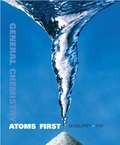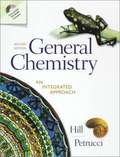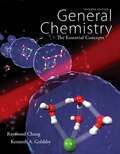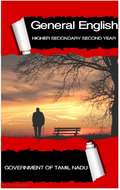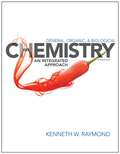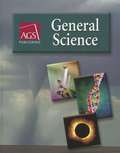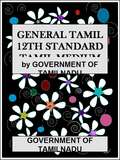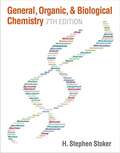- Table View
- List View
General Chemistry: An Atoms-first Approach
by John E. Mcmurry Robert C. FayThis text tells a cohesive story about chemistry that follows an intuitive logic by progressing from the simplest building blocks to successively more complex concepts. It follows a unified thread of ideas that help students build a better foundation and ultimately gain a deeper understanding.
General Chemistry: An Integrated Appraoch
by John William Hill Ralph H. PetrucciMore than any other, this book offers balance - in the topics presented, in its approach to problem solving, and in its presentation of the subject of chemistry. Integrated coverage of organic and biochemistry; integrated applications; integrated tools that foster operational problem-solving and conceptual understanding; and an integrated media learning program. Expanded coverage of key chemistry topics such as organic chemistry, biochemistry, material science, and environmental chemistry.
General Chemistry: The Essential Concepts
by Raymond Chang Kenneth GoldsbyThe seventh edition of General Chemistry continues the tradition of presenting only the material that is essential for a one-year general chemistry course. It strikes a balance between theory and application by incorporating real-world examples; helping students visualize the three-dimensional atomic and molecular structures that are the basis of chemical activity; and developing problem-solving and critical thinking skills. Although the seventh edition incorporates many impressive features, such as conceptual idea review, animations correlated to the text, and hand-sketched worked examples, General Chemistry is still 200 to 300 pages shorter and much less expensive than other two-semester textbooks. Dr. Chang and Dr. Goldsby’ concise-but-thorough approach will appeal to efficiency-minded instructors and value-conscious students.
General English Part - I Paper - I, Year I, School Of Distance Education, Andhra University B.A, B.Com, B.Sc
by M.V. RAJA KUMAR Dvp Ranga Rao Miss. G. MARY PUSHPAThis is prescribed material for students pursuing BA, B.Com, B.Sc 1st year from School of Distance Education, Andhra University for General English subject
General English Workbook class 10 - MP Board
by madhya pradesh rajya shiksha kendra bhopalThis is the work book general english 10th standard book from Madhya pradesh rajya shiksha kendra bhopal in english
General English Workbook class 9 - MP Board
by madhya pradesh rajya shiksha kendra bhopalThis is the work book for general english 9th standard book from Madhya pradesh rajya shiksha kendra bhopal in english.
General English class 11 - Tamil Nadu Board - SCERT
by Government of Tamil NaduThe 21st – Century learner needs to be able to competently collaborate, think critically, solve problems and access digital resources proficiently. Therefore, the revised text books for English Class XI are based on the communicative approach that recognizes our learners’ need to: Seamlessly integrate the use of the four major language skills, namely, listening, speaking, reading and writing, naturally and confidently. Develop an attitude of enquiry and skills for independent research. [Higher Order Thinking Skills- HOTS] Fluency and accuracy in speaking and writing is scaffolded by clear guidelines with examples to ensure appropriate use of format, style, structure etc. Clear, simple guidelines that address learner directly, would support efficient class organization, namely, individual work, Pair work, small group work and whole class work. The syllabus aligns with the recommendations of the National Curriculum Framework 2005.
General English class 11 - MP Board
by madhya pradesh rajya shiksha kendra bhopalThis is general english 11 th standard book from Madhya pradesh rajya shiksha kendra bhopal in english.
General English class 12 - Tamil Nadu Board
by Accessable E-Book Production Unit KVFThe General English syllabus for Class 12 aligns with the Recommendations of the National curriculum framework to understand and appreciate prose, poetry and drama inculcate creativity and initiative.
General English class 9 - MP Board
by madhya pradesh rajya shiksha kendra bhopalThis is the work book general english 9th standard book from Madhya pradesh rajya shiksha kendra bhopal in english.
General Organic And Biological Chemistry: An Integrated Approach, 4th Edition
by Kenneth W. RaymondGeneral, Organic and Biological Chemistry, 4th Edition has been written for students preparing for careers in health-related fields such as nursing, dental hygiene, nutrition, medical technology and occupational therapy. It is also suited for students majoring in other fields where it is important to have an understanding of the basics of chemistry. An integrated approach is employed in which related general chemistry, organic chemistry, and biochemistry topics are presented in adjacent chapters. This approach helps students see the strong connections that exist between these three branches of chemistry, and allows instructors to discuss these, interrelationships while the material is still fresh in students' minds.
General Science
by Donald H. Jacobs Robert H. Marshall Charles J. Larue Allen B. RosskopfThis easy-to-read, richly illustrated textbook, especially useful for students who require extra attention or need additional assistance, offers a comprehensive, systematic overview of key scientific concepts. Fundamental concepts are presented in easily manageable segments.
General Science (2nd Edition)
by Lucy Jane BledsoeThis textbook contains unit lessons on What is Science?, Life Science, Physical Science and Earth Science.
General Science (Semester 1 and 2) class 7 - Andhra Pradesh Board
by State Council of Educational Research and Training Andhra PradeshThis book has 2 semesters. Each semester have 6 chapters. Pupels will be able to understand the concepts of Keywords, improve your learning, Activities and projectworks.
General Science (Semester 1 and 2) class 7 - Andhra Pradesh Board: జనరల్ సైన్స్ (సెమిస్టర్ 1 మరియు 2) క్లాస్ 7 - ఆంధ్రప్రదేశ్ బోర్డ్
by State Council of Educational Research and Training Andhra Pradeshఈ పుస్తకం లో 2 సెమిస్టర్లు కలవు. ఒక్కో సెమిస్టరు లో 6 యూనిట్లు వున్నాయి. పిల్లలు నేర్చుకోవాల్సిన ముక్యమైన అంశాలు కీలక పదాలు,అభ్యసనను మెరుగు పరుచుకుందాం, ప్రశ్నలకు జవాబులు రాయడం, కృత్యాలు మరియు ప్రాజెక్టు పనులు.
General Science -Civil service- Competitive Exam
by Indic TrustThis is a compilation of questions answer of General Science For Civil Services Competitive Examinations.
General Science class 6 - Andhra Pradesh Board
by State Council of Educational Research and Training Andhra PradeshThis book has 12 chapters. Pupils will be able to focus on Activities, Do you know,Think and discuss,keywords and improve your learning. Teachers give projects to students for improving knowledge.
General Studies Environment and Ecology - Competitive Exam
by Indic TrustThis is a compilation of questions answer of General Studies Environment and Ecology For Civil Services Competitive Examinations.
General Studies Indian Economy I and II - competitive exam
by Sriram IasThe best book on Indian Economy By SRIRAM IAS, recommended by civil service exam experts. The book includes the previous year question and point by point description and analysis.
General Studies Solved Paper II Competitive Exam
by Indic TrustThis is a compilation of questions answer of Civil Service Examination 2017 General Studies Papers II.
General Tamil class 10 - Tamil Nadu Board - SCERT: தமிழ் பத்தாம் வகுப்பு
by Accessible E-Book production Unit KVFஇந்த 10ஆம் வகுப்பு பாடப்புத்தகத்தில் பலவிதமான கவிதைகளும், மேதைகளைப் பற்றியும் நாம் தெரிந்து கொள்ள முடிகிறது. இதை பயன் உள்ள வகையில் நாம் பயன்படுத்தி கொள்ள முடியும்.
General Tamil class 11 - Tamil Nadu Board - SCERT: பொது தமிழ் வகுப்பு 11 - தமிழ்நாடு வாரியம் - எஸ்.சி.இ.ஆர்.டி.
by Government TamilnaduEducation is not only the way to become wise but it is the foundation of life forever. We have understood that the textbooks in students hands create a way to succeed as well as lead others to follow up with new inventions. The methods and technics used in this book will definitely make the students to feel free and comfortable even while learning tough concepts.
General Tamil class 12 - Tamil Nadu Board
by Government TamilnaduEducation is not only the way to become wise but it is the foundation of life forever. We have understood that the textbooks in students hands create a way to succeed as well as lead others to follow up with new inventions. The methods and technics used in this book will definitely make the students to feel free and comfortable even while learning tough concepts.
General, Organic, And Biochemistry: An Applied Approach
by James ArmstrongFocusing on key topics important in allied health and nursing careers, this engaging book is ideal for readers who have had no prior exposure to chemistry. Emphasizing problem-solving techniques, the book takes the most direct path to biomolecules and metabolic processes, provides a wealth of worked examples to help readers understand key chemical concepts, includes novel and relevant "Health Notes" in the margins, and weaves biological and medical applications throughout.
General, Organic, And Biological Chemistry
by H. Stephen StokerSucceed in chemistry with GENERAL, ORGANIC, AND BIOLOGICAL CHEMISTRY'S clear explanations, engaging visual support, and easy usability. Ideal for allied health majors, this Seventh Edition emphasizes the applications of chemistry. Early chapters focus on fundamental chemical principles while later chapters build on the foundation of these principles, developing the concepts and applications central to organic and biological chemistry. Mathematics is introduced at point-of-use and only as needed.
